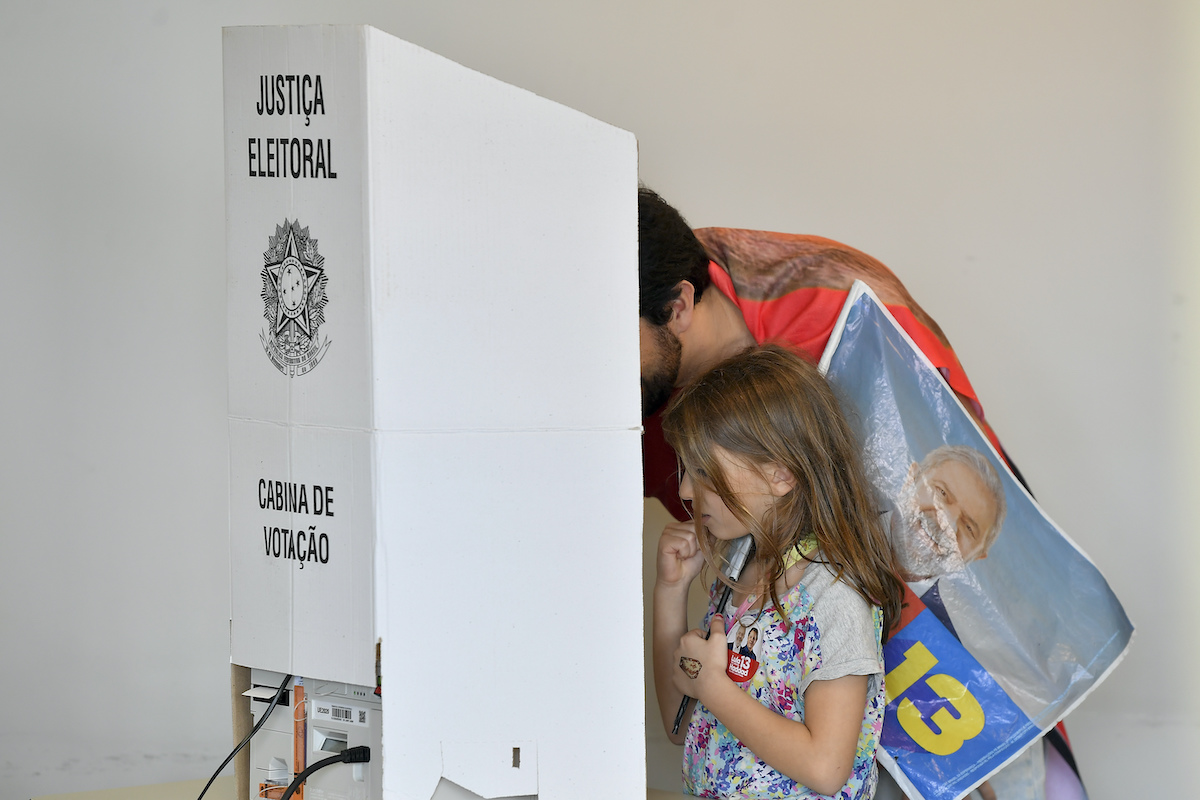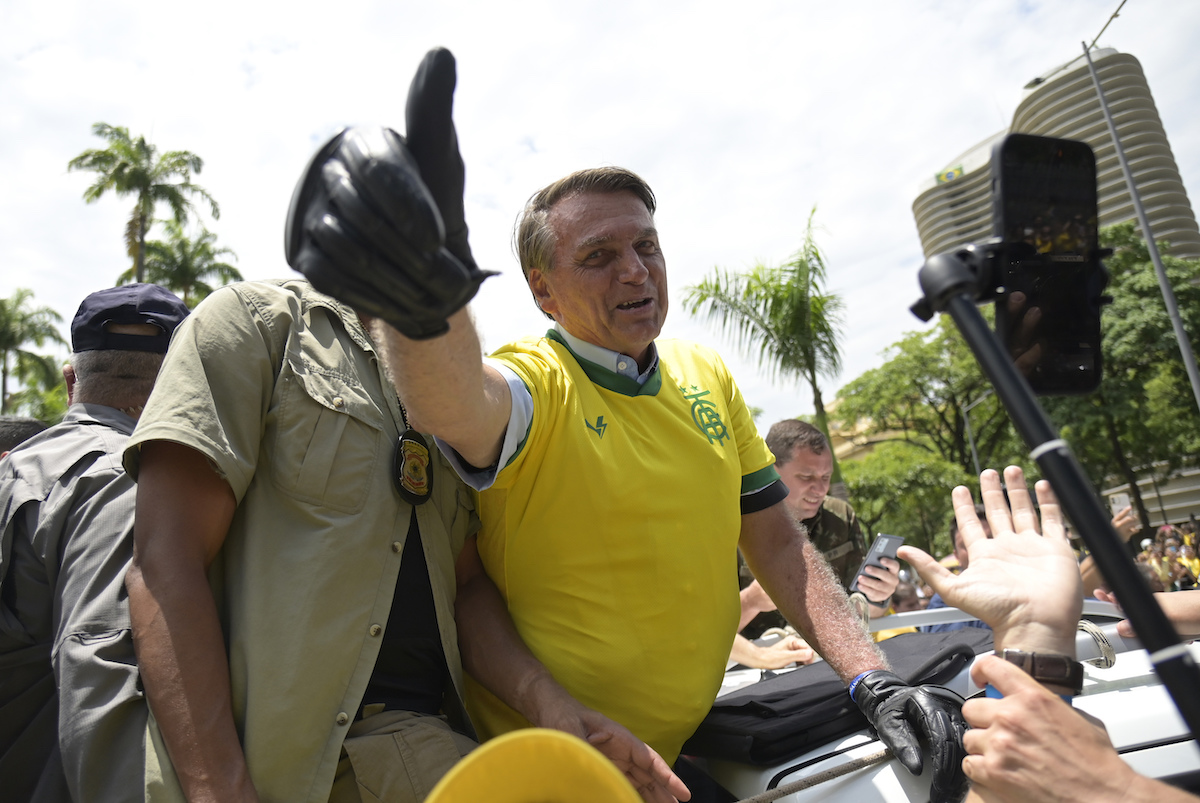Stand up for the facts!
Our only agenda is to publish the truth so you can be an informed participant in democracy.
We need your help.
I would like to contribute

A forensic investigator stands outside the Brazilian Supreme Court that was damaged by supporters of Jair Bolsonaro angered over election results. (AP photo/Eraldo Peres)
Tucker Carlson’s unfounded claim that Brazil’s election was rigged
If Your Time is short
-
Former President Donald Trump and his allies spread the falsehood that the 2020 U.S. presidential election was rigged against him. Now some Trump-allied pundits, including Fox News commentator Tucker Carlson, are spreading a similar wrong talking point about Brazil’s October 2022 election.
-
In 2021, the Superior Electoral Tribunal (known by its Portuguese acronym, the TSE), created the Election Transparency Commission, which includes experts, civil society entities and public institutions in the inspection and auditing of the electoral process.
-
Brazilian and international observers of the election concluded that the election was safe.
Fox News host Tucker Carlson spread falsehoods that the 2020 U.S. presidential election was rigged against former President Donald Trump. Now, he is spreading a similar myth without evidence about Brazil’s recent presidential election.
Former leftist leader Luiz Inácio Lula da Silva defeated far-right incumbent President Jair Bolsonaro on Oct. 30 by a margin of about 2%, or 2 million votes. Bolsonaro claimed the election was fraudulent.
Protests by Bolsonaro’s supporters followed, and more than 1,000 people Jan. 8 stormed and vandalized Brazil’s government buildings including Congress, Supreme Court and presidential offices. They smashed windows and set fires.
Bolsonaro was in Florida during the attack.
For Americans, the scene was reminiscent of the Jan. 6, 2021, attack on the U.S. Capitol by Trump supporters. Carlson characterized the actions in Brazil as a justifiable uprising based on anger and "frustration."
"Consider what is happening tonight in Brazil," Carlson said on his show a day after the Brazil attack. "Thanks to what was very clearly a rigged election, a convicted criminal called Lula da Silva is now the president of the most important country in South America. Millions of people in Brazil understand exactly what happened. They know their democracy has been hijacked possibly forever."
Lula, who was president from 2003 to 2010, was sentenced by a Brazilian judge in 2017 for corruption and money laundering. The U.N. Human Rights committee said the criminal proceedings against Lula violated due process guarantees; Lula said he was innocent. A Supreme Court judge annulled Lula's corruption convictions in March 2021, clearing him to run for office.
We contacted Fox News to ask for Carlson’s evidence and got no response. Our interviews with experts on Brazil’s election showed no evidence that the election was rigged.
Experts on Brazil’s election say there is no evidence of rigging
To address fraud, Brazil in 1996 began moving from paper ballots to electronic voting machines. Four years later, it held its first electronic-voting-only election. The machines are not connected to the internet and have security layers, according to Aos Fatos, a fact-checking website in Brazil. Voting is compulsory for adults and is done in person. Many voters use their fingerprints to unlock the machines, though some still present photo identification. The country hopes to have all voters using biometric identification by 2023.
The New York Times found that Bolsonaro for years built the myth of stolen elections. Even in the 2018 presidential election that he won, he claimed hackers tried to steal it, but failed. Besides Carlson, U.S. pundits such as Steve Bannon, a former Trunp adviser, are spreading the falsehood, too.
On Gettr, a right-wing social media platform, Bannon wrote several posts Jan. 8 alleging "Lula stole the election." The Washington Post has reported that Bannon is advising Bolsonaro and his son, Eduardo.
Brazilian officials worked to increase transparency before the election. In 2021, the Superior Electoral Tribunal (known by its Portuguese acronym, the TSE), created the Electoral Transparency Commission, which includes experts, civil society entities and public institutions in inspecting and auditing the electoral process.
More than 100 entities in Brazil have the power to inspect the electoral process, the TSE said, including political parties, the military, the federal police and accredited information technology experts. Those groups may inspect the voting machines’ source code up to a year before the election and request clarifications.
Auditing involves integrity tests in the months before an election, and a public test on Election Day. A smartphone app lets voters compare voting results from a polling station with the totals announced by the TSE.
The TSE said the Electoral Observation Missions concluded that the electoral process is safe, reliable and transparent. More than 100 international observers were present for the October elections, and representatives from multiple Brazilian institutions observed the election.
Pablo Ortellado, a public policy professor at the University of São Paulo, told PolitiFact that Bolsonaro and his supporters have not produced evidence showing the election was rigged.
"Election experts are unanimous that elections in Brazil are fair and safe — although some want a few changes in the voting machines," Ortellado said.
Academics at Brazilian universities were given authorized access to voting machines’ source code to run independent tests ahead of the elections, said Professor Marcos Simplicio, cybersecurity researcher at the University of São Paulo. Along with researchers at other universities, the experts aimed to identify vulnerabilities that might allow violation of vote secrecy or integrity. (Simplicio is vice coordinator of the University of São Paulo’s partnership with TSE that is aimed at improving the Brazilian electronic voting system.)
"We did find and suggest security improvements to the machines, some of which were successfully implemented before the elections," Simplicio told PolitiFact. "However, we could not find any attack venue that might compromise the elections’ results, especially in the scale required to rig a presidential election. Hence, we can say with confidence that the interference of third parties in the election process is highly unlikely."
Simplicio said testing has shown that voting machines’ ability to repel third-party attacks is robust.
The Order of Attorneys of Brazil, the bar association regulating the country’s attorneys, also saw no irregularities after monitoring vote tallies in both rounds of Brazil’s election. They wrote in a report that "Brazil witnessed clean, transparent and safe elections."
Experts based in the U.S. have also not found evidence of a rigged election.
At the TSE’s invitation, the Carter Center in Atlanta sent a team of election experts to Brazil. They found that the TSE provided extensive audit procedures to address the voting software’s integrity, based on recommendations after previous elections.
Jennie Lincoln, the Carter Center’s special adviser on Latin America and the Caribbean, said the center knew of no evidence of fraud in the election, and that the international and Brazilian election observers reported none.
Scott Mainwaring, a University of Notre Dame political science professor and an expert in Latin American politics and Brazil, told PolitiFact that Brazil’s electoral system is secure.
Mainwaring said that because Brazil's system is centralized and uniform, it’s "more secure and much less vulnerable to shenanigans."
Fact-checkers in Brazil at Aos Fatos debunked claims suggesting a fraudulent election, including that voters’ selections were not counted.

A man votes accompanied by a girl during a presidential run-off election in Sao Paulo, Brazil, Sunday, Oct. 30, 2022. (AP)
Academics have called for ways to improve the security of machines
That experts found no evidence of rigging does not mean the electoral system in Brazil is perfect.
Diego Aranha, an associate professor of systems security at Aarhus University in Denmark, said academics analyzing the machines over the past decade have "found significant vulnerabilities with the machine design and implementation" that the electoral authority has been slow to fix. But he said the most serious ones were fixed around 2020, including a vulnerability that could allow malicious software to be installed.
Academics have long advocated for improved audits and a voter-verifiable paper audit trail, an important security feature. A paper trail allows voters to verify the paper ballot directly by seeing it; officials also can count the paper ballots to ensure they match the electronic results. Bolsonaro's proposal to create a voting system with a paper trail failed to pass in Congress in 2021.
Despite limitations of the voting machines used in Brazil, Aranha said, "there is no robust evidence that the 2022 elections were ‘rigged.’" The 2022 elections were the most transparent since the voting machines were introduced, he said.
Bolsonaro, who served seven straight terms in Brazil’s Chamber of Deputies, was elected repeatedly "by the very same machines he now rallies against," Aranha said. "He has turned a legitimate technical concern into a political weapon, in perfect line with his government style and policies, with the consequences you saw during the weekend."
Our ruling
Carlson said the election in Brazil "was very clearly a rigged election."
Officials in Brazil have taken several steps to increase voting security, including the formation of a transparency commission before the election that includes experts who inspect and audit the electoral process.
The Carter Center, which sent observers to Brazil for the election, said it was not aware of any evidence of fraud, and none of the international or Brazilian observers reported any evidence of significant fraud. More than 100 international observers were in Brazil for the elections in October.
Academics have suggested ways to improve the security of the machines, but saying security could be strengthened is not akin to evidence of rigging.
Carlson has not provided evidence that the election was rigged.
We rate this statement False.
RELATED: Tucker Carlson on the Truth-O-Meter
RELATED: Viral photo of copycat ‘QAnon shaman’ in Brazil wasn’t taken during 2023 riots
RELATED: Trump’s baseless claim about 2020 election fraud and suspending the Constitution
Staff researcher Caryn Baird contributed to this report.
Our Sources
Fox News Network, Tucker Carlson Tonight transcript (accessed in Nexis), Jan. 9, 2023
Media Matters, Tucker Carlson says Brazil’s election "was very clearly a rigged election," Jan. 9, 2023
Order of Attorneys of Brazil, "In a report to the TSE, OAB concludes that there was no suspicion of irregularities in the voting," Nov. 8, 2022 (translated into English by Google)
Brazil Superior Electoral Tribunal, "Electronic ballot box," accessed Jan. 10, 2022
Brazil Superior Electoral Tribunal, "Audit and supervision," accessed Jan. 10, 2022
Brazil Superior Electoral Tribunal, "Electronic ballot box of 2000 allowed the first 100% computerized election," updated Jan. 10, 2023
Aos Fatos, What happens to electronic voting machines after the election, Dec. 21, 2022
Aos Fatos, What are the main lies spread on the networks against the electoral system, Sept. 27, 2022
Reuters, Brazilian elections safe and transparent: International observers, Oct. 5, 2022
BBC, Brazil's Bolsonaro defeated over printed ballot proposal, Aug. 11, 2021
BBC, Lula: Brazil ex-president's corruption convictions annulled, March 9, 2021
The Carter Center, "Carter Center Electoral Expert Mission Concludes Assessment and Issues Initial Key Findings," Nov. 4, 2022
Organization of American States, "OAS Electoral Observation Mission Presents its Preliminary Report following the Second Round of the Elections in Brazil," Nov. 1, 2022
Washington Post, Brazil’s riot puts spotlight on close ties between Bolsonaro and Trump, Jan. 9, 2023
The Washington Post, "Trump aides Bannon, Miller advising the Bolsonaros on next steps," Nov. 23, 2022
The Washington Post, "The far right rails against another presidential election loss: Brazil’s," Nov. 2, 2022
NPR, Why false claims about Brazil's election are spreading in far-right U.S. circles, Oct. 22, 2022
New York Times, How Bolsonaro Built the Myth of Stolen Elections in Brazil, Oct. 25, 2022
New York Times, Brazil Counted All Its Votes in Hours. It Still Faces Fraud Claims. Nov. 10, 2022
New York Times, Bolsonaro attacks Brazil’s voting system. How does it actually work?, Oct. 30, 2022
New York Times, What We Know About the Investigations Into the Brazil Protests, Jan. 9, 2023
New York Times, What Drove a Mass Attack on Brazil’s Capital? Mass Delusion. Jan. 9, 2023
AP, Bolsonaro contests Brazil election loss, wants votes voided, Nov. 22, 2022
PolitiFact, US election deniers spread false claims about Brazil vote, Nov. 4, 2022
Fox News, Tucker Carlson: Yes, the election was rigged for Joe Biden. Here's how, Nov. 23, 2020
Email interview, Pablo Ortellado, professor of public policy, Universidade de São Paulo, Jan. 10, 2023
Email interview, Prof. Paulo Matias, department of computing professor, Federal University of São Carlos, Jan. 10, 2023
Email interview, Marcos Simplicio,, professor in the department of computer engineering and digital systems, University of São Paulo, Jan. 10, 2023
Email interview with Diego Aranha, associate professor of systems security at Aarhus University in Denmark, Jan. 10, 2023
Email interview with Jennie Lincoln, the Carter Center’s Special Advisor on Latin America and the Caribbean, Jan. 10, 2023
Email interview with Scott Mainwaring, political science professor at the University of Notre Dame, Jan. 9, 2022
Browse the Truth-O-Meter
More by Jeff Cercone
Tucker Carlson’s unfounded claim that Brazil’s election was rigged
Support independent fact-checking.
Become a member!
In a world of wild talk and fake news, help us stand up for the facts.












































